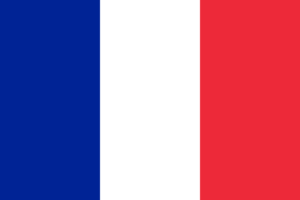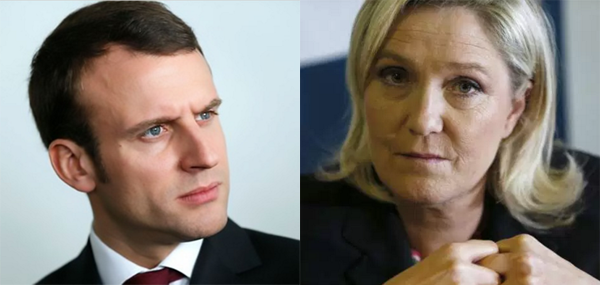13 April 2017
The French election
What can the literature teach us about the candidates and their policies?
by Richard Pooley

 The election pamphlets have started appearing in my letter box, marking the official opening of the campaign to elect the next Président(e) de la République. Unofficially, of course, the campaign has been going on since last summer, if not earlier. I wrote an article in February last year – in which I mentioned that Emmanuel Macron might run for president, though with little chance of winning. So far, I have only had leaflets from him and Marine Le Pen, the two candidates still – just – heading the opinion polls. This is a little strange. The Lot Department is traditionally Socialist, apart from the little corner where I live which has recently favoured the Republicans. My neighbour, the mayor of the village, insists that he is of no party when it comes to his mayoral duties. However he was elected – twice – on the old UMP, now Republican, ticket. So, where are the leaflets extolling the virtues and policies of Socialist Party candidate, Benoît Hamon, and those of the Republican Party’s man, François Fillon?
The election pamphlets have started appearing in my letter box, marking the official opening of the campaign to elect the next Président(e) de la République. Unofficially, of course, the campaign has been going on since last summer, if not earlier. I wrote an article in February last year – in which I mentioned that Emmanuel Macron might run for president, though with little chance of winning. So far, I have only had leaflets from him and Marine Le Pen, the two candidates still – just – heading the opinion polls. This is a little strange. The Lot Department is traditionally Socialist, apart from the little corner where I live which has recently favoured the Republicans. My neighbour, the mayor of the village, insists that he is of no party when it comes to his mayoral duties. However he was elected – twice – on the old UMP, now Republican, ticket. So, where are the leaflets extolling the virtues and policies of Socialist Party candidate, Benoît Hamon, and those of the Republican Party’s man, François Fillon?
I love analysing election leaflets. What messages – overt and subliminal – do they convey? Which of the candidate’s policies are focused on and which ignored? What do they reveal about the character of the candidate?
Marine Le Pen wants you to call her by her first name. Her surname – toxic to many French – is almost absent from her four leaflets, totalling twelve pages. Even more astonishing, her party is mentioned just twice, in small print, – “… elle reconstruit un Front National rénové…”. The party’s emblem is a blue rose – “a symbol of ‘the impossible’ which can become real”. It runs through or under “MARINE Présidente” on nine of the pages. The most impressive leaflet is the one targeted at women. You don’t need to know much French to understand it: “Une Femme de Coeur – Derrière la femme politique, la mère, la soeur.” No mention of being a daughter, of course. “Dans un Monde d’Hommes – Être femme en politique est un atout, pas un handicap.” Perhaps you need help with ‘atout’. I did. It means ‘trump’ as in ‘trump card’. See what I mean about hidden messages. Inside the same leaflet is an extraordinary appeal to the emotions of female voters. “This is who I am! The document you have in your hands is born out of a fact: the French know little about me or think badly of me” (it’s punchier in French). She admits that this ignorance is partly her fault; she wanted to protect her privacy. Her love and respect for her sisters and her children is evident. She is proud of the fact that she had three children in one year – a daughter, then twins. She says this turned her life upside down and taught her all she needed to know about the problems and injustices faced by women who juggle parenthood with a career (she was the French equivalent of a barrister before she became a politician). She does not hide the tough childhood she had, including her “miraculous escape” when a bomb meant to kill her father destroyed the family’s apartment. The last photograph is of her at the wheel of a yacht, her blonde hair flowing out behind her. Frankly, I am not surprised at reports that she is winning over many French women voters.
Nor am I surprised that Emmanuel Macron’s campaign has lost momentum. His pamphlet neither informs nor inspires. Okay, it is only four pages and has one main purpose: to get more people to join his new movement – En Marche! – which currently has 230,000 signed-up members. But it is so bland. Even for a people who love abstract concepts “Transparence and exigence seront les maîtres-mots de mon quinquennat” is not a slogan which will have them manning the barricades or running to the voting booths. “Transparency and demands will be the watch-words of my 5-year term.” Perhaps a francophone reader can provide a better translation of “exigence” but this was the best I and my bilingual wife could come up with. Macron promises to bring in a law “de moralisation de la vie publique”. The words are in bold, as are those which itemise what this means; for example: stopping anyone elected to office from employing members of their family, and reducing the number of parliamentary deputies (MPs) and senators “by around a third”. But emboldening a word like ‘moralisation’ does not make it more exciting. Marine Le Pen does not talk at all about the need to keep politicians honest. Perhaps this is because she and her party have so flagrantly disobeyed the rules, on expenses, on the employment of assistants from the European Parliament, and on downwards. But she does agree with Macron that the number of deputies and senators should be reduced. However, unlike him, she is specific: “Cut the number of deputies to 300 (against 577 today) and the number of senators to 200 (against 348 today).”
And what about the other candidates? I look forward to seeing how they sell themselves and their policies in their election literature. How, for example, will Jean-Luc Mélenchon persuade the French that it would be a great idea to impose a 100% income tax on all earnings over €360,000? How will he square his insistence that he does not want France to leave the European Union with his statement that he will disobey the EU’s “fiscal compact”, which sets deficit limits for EU countries, and will renegotiate any EU treaty which conflicts with his anti-capitalist agenda? How will Fillon deal with the smell of corruption which has clung to him for the past two months? How will he convince France’s millions of civil servants and state workers, voters all, that it is necessary to cut the number of public jobs by 500,000? And what about hapless Hamon? He has some of the most interesting ideas of any of the candidates – a basic monthly income of €750 for every French adult which would be financed by a tax on robots, 50% of France’s energy to come from renewables by 2025, the legalisation of marijuana. But few appear to be listening to him.
Expect an update next week on any new election pamphlets which strike me either as very good or as very bad. In the meantime watch a race which is becoming tighter and more unpredictable by the day. I said at the beginning of the year that nobody in France knows which way it will go. That is still true with just ten days before the first round. We are about to witness game theory in action: the outcome of the first round of this election depends on who each French person thinks his fellow citizens are going to vote for. More on this next week.
If you enjoyed this article please share it using the buttons above.
Please click here if you would like a weekly email on publication of the ShawSheet

